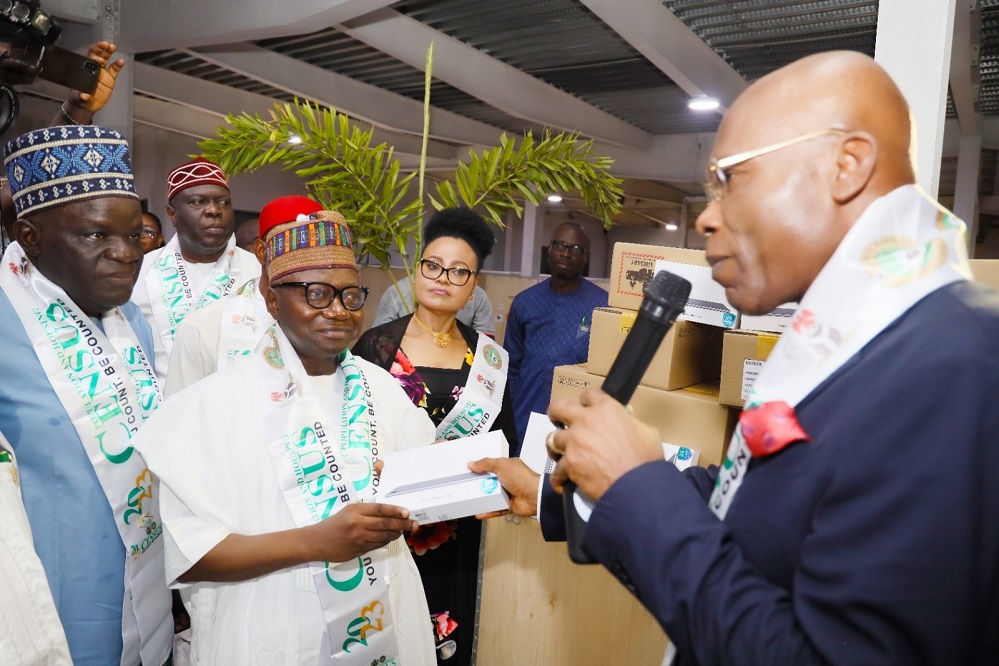Telecom
FG Awards over N85Bn Census Contract to Zinox Technologies

Federal Government through the National Population Commission (NPC) has signed a landmark deal with Nigeria’s leading integrated technology brand, Zinox, for the supply of the tech components and other accessories for the 2023 national census project, further justifying President Muhammadu Buhari administration’s commitment on local content promotion.

Chairman, Zinox Group, Leo Stan Ekeh (right) handing over a sample of the Personal Digital Assistant (PDA) device for the 2023 census to the Chairman, National Population Commission (NPC), Hon. Nasir Kwarra during a briefing in Lagos at the weekend
The contract, worth over N85bn, was recently awarded to Zinox after ratification by the Federal Executive Council (FEC).
Zinox, which has already commenced supply of the first batch of about 100,000 units of the Personal Digital Assistants (PDAs) devices required for the nationwide enumeration, emerged the undisputed and preferred technical partners for the exercise after scaling a rigorous bid process involving other local and international competitors.
Feelers from senior sources at the Presidency and within the NPC indicate that Zinox stood out in the intense series of background checks conducted to affirm the capacity, experience, integrity and ethical standing of the bidders, with the technology giant also meeting the rating as an indigenous technology powerhouse with global connections which has consistently enjoyed the confidence of leading Original Equipment Manufacturers (OEMs) and other tech heavyweights the world over.
This, it was learnt, earned it an overwhelming endorsement by the Federal Government for the project. Also, to its credit is the fact that it was Zinox that rescued the nation’s voter registration exercise in 2006 and 2010 when big foreign tech companies contracted by the Independent National Electoral Commission (INEC) could not deliver as scheduled.
Zinox used its Z-Pad smart device to lay the foundation for Nigeria’s digital democracy upon which INEC is building on today. The smooth execution of the over $200m INEC contract in 2010 added impetus to the profile of Zinox as a strong indigenous company with capacity and competence.
Leo Stan Ekeh, Chairman, Zinox Group, said that the company had built a system of integrity and a record of excellence, both in Nigeria and internationally. Further, Ekeh noted that until there was a credible data census figure, the country cannot plan well.
Also, Mrs. Kelechi Okonta, Managing Director, Zinox Technologies, said: “It is a privilege for the Federal Government to consider us among many other companies in the world. They know we have the capacity. We are deploying all our resources to make sure it is successful.”
The 2023 census, scheduled to hold between March and April, will be the fifth to be conducted by the Nigerian government since independence in 1960 and it is coming 17 years since the last edition which was held in 2006 under the administration of President Olusegun Obasanjo.
President Buhari, who has not hidden his desire to bequeath to the next administration a useful, reliable and credible databank which captures Nigeria’s salient socio-economic and demographic information to underpin proper national planning, has thrown his weight behind efforts by the NPC to ensure a successful exercise. To this end, Zinox on Friday, February 3, 2023 hosted a high-powered delegation of commissioners and management team of the NPC led by the Chairman, Hon. Nasir Isa Kwarra, where the first 100,00 units of the digital devices were presented to the commission.
It could be recalled that Zinox introduced automation of Nigerian elections, first with the introduction of the Direct Data Capture (DDC) machines which helped to clean up the nation’s voter register and later the card reader which enhanced credibility of elections in Nigeria in recent years.
Zinox had also executed major projects offshore in Guinea Bissau, The Gambia and the Arab nations through partnerships.
The handover ceremony which was held in one of Zinox’s massive warehousing facilities in Lagos, saw the cutting-edge features of the PDAs unveiled to a mixed audience, including representatives of the NPC and sections of the media. Encrypted with census questionnaire and maps to direct enumerators to assigned enumeration areas, the devices were hailed as key components in the conduct of an exercise that would not only meet global standards but equally ensure accuracy of data collected.
The NPC Chairman noted that the 2023 census would signal a new dawn in housing and human headcount in Nigeria as there would be no over-counting or under-counting, adding that the devices, when commissioned with the forms, maps and other digital enhancements, would ensure that enumerators are unable to go beyond the areas assigned to them. In addition, he commended Zinox for the dedication, commitment and huge capacity displayed in the way it has commenced execution of the contract.
He noted that the software (App) that would be deployed to enable and activate the PDAs was locally developed, thus fulfilling President Buhari’s Executive Order on local content, as well as the National Information Technology Development Agency (NITDA) regulation on Local Original Equipment Manufacturers (OEMs) in the procurement of the PDA devices.
The NPC Chairman said: “With all enhancement that the National Population Commission is provisioning the devices with, e.g, the Mobile Device Management, we can monitor the enumerators on the field and ensure that the data provided by Nigerians are secured and well managed for their privacy.
‘‘The geospatial resources that NPC has acquired will be deployed on the devices. This will ensure that all Nigerians are counted where they are and live. We will also be able to collect statistics on housing type and characteristics for better physical and social planning by government for the nation.
‘‘The homeless will be counted, tied to their usual place of abode, referenced with geo-coordinates; the Special Population: nomads, migrants, people in transit, etc, will be counted with geo-reference to where they are found at the time of the Census. Everyone will be counted because all Nigerians count,” he noted.
Telecom
Glo Unveils Immersive Gaming Experience, Travel Saga

With the introduction of Travel Saga, a premium, fast-paced gaming experience that is currently live and accessible to customers on its network, Globacom has lifted the bar for mobile entertainment in the country.

Travel Saga is a story-driven, intricately connected role-playing game designed to provide the thrill, complexity, and competitive intensity of some of the most well-known action games in the world.
The game, which has been painstakingly optimized for mobile devices, redefines mobile gaming as a full-fledged digital battlefield by translating a console-grade experience onto data-enabled handsets.
Fundamentally, Travel Saga takes users on quick virtual journeys against recognizable international landscapes. In a dynamic, ever-evolving gaming environment, players are thrown into furious missions, fierce fights, and ever-expanding tales where talent, strategy, and endurance determine who rises through the ranks to become a true war hero.
In addition to the excitement of fighting, users are encouraged to go to various locations, take part in thrilling challenges, and participate in intense competition for in-app rewards like points and victory badges. With each encounter and accomplishment, the immersion increases with each level, maintaining momentum and excitement.
Flexible subscription plans with one-time or auto-renewal choices are available to subscribers for the service, which costs ₦100 per day and ₦250 per week. By dialing *70021#, customers can quickly subscribe and gain instant access to the action.
With Travel Saga, Glo reaffirms its dedication to innovation and high-end digital experiences, making top-notch gaming easily accessible to its customers. The game offers uninterrupted action, adventure, and competition, all smoothly supported by the Glo network.
Telecom
SHELT Named in Prestigious 2025 MSSP 250 List for Cybersecurity Excellence

SHELT, a leading cybersecurity-as-a-service provider, has earned inclusion in the 2025 MSSP 250, the annual ranking of the world’s top 250 Managed Security Service Providers (MSSPs) by MSSP Alert, a CyberRisk Alliance publication.

SHELT
The list evaluates firms on business performance, service breadth, and industry impact, spotlighting those excelling in growth, operational excellence, and advanced managed security amid rising cyber threats. Selection criteria include annual recurring revenue, profitability, workforce expansion, business growth, and the depth of managed security offerings.
SHELT’s recognition underscores its investments in scalable security operations, threat intelligence, and tailored managed services across multiple regions, enabling clients to navigate complex risk landscapes effectively.
“Being recognised in the MSSP 250 is a meaningful milestone for our team,” stated Youssef Abillama, CEO of SHELT. “It validates our focus on building practical, resilient security services that help organisations manage risk and respond effectively to today’s evolving cyber threats.”
The company hailed the honour as testament to its teams’ dedication and expertise worldwide, reaffirming commitment to enhancing capabilities and delivering trusted cybersecurity solutions.
Telecom
Meta Names Ex-Trump Adviser Dina Powell McCormick as President

Meta Platforms, owner of Facebook, has appointed Dina Powell McCormick, a former adviser to President Donald Trump, as its new president and vice chairman, bolstering its leadership amid aggressive AI and infrastructure expansion.

Dina Powell McCormick
The announcement, made on Monday, positions Powell McCormick – who recently stepped down from Meta’s board after eight months – to guide overall strategy, including multi-billion-dollar investments in data centres and global partnerships.
A Goldman Sachs veteran with 16 years in senior roles and prior stints as deputy national security adviser under Trump and in the Bush administration, she brings deep finance and international ties to the role.
Meta CEO Mark Zuckerberg hailed her as “uniquely qualified” for the company’s next growth phase, while President Trump praised the move on Truth Social as a “fantastic choice”.
The hire signals Meta’s efforts to strengthen White House relations, following recent dinners with Trump and U.S. investment pledges worth hundreds of billions

 General News3 days ago
General News3 days agoPalmPay, Premier Cool to Reward 10,000 Nigerians with ₦100m in “10k for 10k Campaign”

 E-Financial3 days ago
E-Financial3 days agoEcobank Joins Trillion-naira Club for the First Time in 20 Years

 E-Business3 days ago
E-Business3 days agoKaspersky Warns Telecom Threats from 2025 will Carry into 2026 as New Technology Adds New Risk

 E-Business3 days ago
E-Business3 days agoNigerian Terra Industries Secures $11.8m for Expansion

 E-Financial2 days ago
E-Financial2 days agoAngst as FG Demands 7.5 Percent VAT on Mobile Bank Transfers, USSD

 Telecom3 days ago
Telecom3 days agoSHELT Named in Prestigious 2025 MSSP 250 List for Cybersecurity Excellence

 News2 days ago
News2 days agoMoniepoint Launches Second Cohort of DreamDevs Initiative to Double Down on Africa’s Tech Talent Pipeline

 E-Business2 days ago
E-Business2 days agoHalf of Global Companies Build SOCs to Enhance Cybersecurity, with a Focus on Human Expertise



























